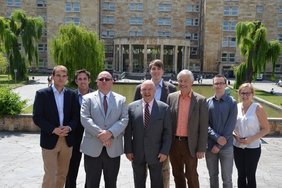“It depends”. Those magic words were emphasized as useful by Prof. em. Lawrence R. Chalmer (National Defense University Washington D.C.) when discussing “NATO in its 60s – What is its Future?” in Frankfurt on June 13, 2014.
In cooperation with the United States Consulate General of Frankfurt, FAUST organized a vivid roundtable discussion on past and future challenges of NATO. Furthermore, the session, hosted and moderated by Markus Liegl (research associate at Goethe-University), also brought together Consul General Kevin C. Milas, Public Affairs Officer Jeffrey M. Hill and Dr. Gerhard Wiesinger from the Consulate General of the United States of America as well as PRIF researchers Dr. Hans-Joachim Schmidt and Dr. Niklas Schörnig and approximately 25 students at the Goethe University in Frankfurt am Main.
Chalmer briefly outlined some fundamental articles of the NATO treaty, including Articles 4 and 5, highlighting the importance of sovereignty and necessity of consensus among all member states in their NATO decision making. In the light of the upcoming NATO summit in Wales this September, Chalmer also shared his thoughts on possible agenda topics, especially the exit from Afghanistan, the reinstatements of existing engagements, e.g. the counter-piracy missions, and statements in support of Ukraine. Moreover, he expected a strong language on the Alliance’s assistance for Poland against the backdrop of the Ukrainian crisis.
Consul General Kevin Milas and Prof. Chalmer each encouraged the audience to contribute to and build upon Germany’s leadership role in the EU and in particular to examine and strengthen their national self-confidence. Besides other comments, the latter was replied by Dr. Schörnig by stating the unwillingness of German politicians to play a more decisive role in the Alliance and the EU against the background of the troubled German past. In addition, Dr. Schörnig emphasized that the potential over-confidence on part of the United States of America in the last two decades has at least partially proven counterproductive.
"It depends”, as Chalmer put it, can become a useful default answer for those involved in examining complex NATO policy and international security issues among 28 countries, deterring hasty decisions and allowing time for sound analysis contributing to a mature decision-making process.



